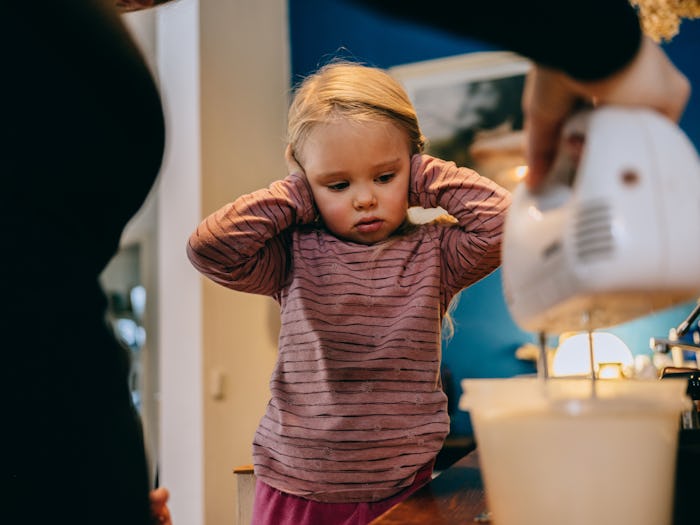Shhhh

If Your Toddler Freaks Out About Loud Sounds, You’re Not Alone
There’s literal hell, and then there’s a public bathroom with hand dryers.
Watching your baby grow into a toddler is an absolute delight — you get to see their personality take shape and really shine. Maybe they like to sleep upside down in bed or covered head-to-toe in their blanket. Some kids love to play clean, while others live to dump all their toys on the floor. So if you notice your toddler hates loud noises, trust that you’re not alone. It’s actually pretty common for young kids to fear unexpected or loud sounds.
If your child is sensitive to noise, you’ve probably noticed they cover their ears in loud places. They might act fearful of things like vacuums, blenders, and the toilets and hand dryers in public bathrooms (why do those toilets flush so aggressively?). And after a loud noise, chances are they cry and need some hugs from you to feel safe again. So, what’s up with that, and do you need to be worried?
Is it normal for toddlers to not like loud noises?
Research says sound sensitivity (known as hyperacusis, in doctor speak) in present in anywhere from 3% to 17% of children. It’s common in toddlers and children of preschool age, but “usually goes away with maturation,” according to Boston Children’s Hospital.
The fear of loud noises is pretty typical in kids under 5, says Hannah Widner, AuD, CCC-A, audiologist at Children’s of Alabama. And honestly, their reaction makes perfect sense. “If you think about it, a lot of those sounds that upset little kids and toddlers are loud sounds. The flushing of the toilet in the public restroom, that’s louder than it is at home. Their little ears and brains are not used to that. They haven’t had that exposure we have as adults, where we’ve grown to just kind of tune that out. As an adult, my brain says, ‘Hey, deal with it. Move on. It’s loud, but you’ll live.’ But really, it’s a healthy reaction to say, ‘Oh, this is loud.’ And, that's exactly what their ears and their brains are doing.”
Most children outgrow this sound sensitivity by the time they enter kindergarten, Widner says. They’ll have had a little more time to get used to all the lawnmowers, fireworks, and other sudden bursts of sound in the world.
Is sensitivity to loud noises a sign of autism?
What if your child doesn’t grow out of their sensitivity to sound? It could be a sign of a neurodevelopmental issue, according to Boston Children’s Hospital. Children can also develop hyperacusis later in life as a result of another health condition, like Lyme disease, or head trauma, like a concussion.
“Certainly with autism there can be a sensitivity to loud sounds. It’s not always something that exhibits itself with autism, but it’s not uncommon for that to be one of the things that we see,” says Widner. If your child is afraid of loud noises and that’s the only autism-related behavior you observe from them, it’s probably no biggie, Widner says. “Part of autism often is also those communication delays or speech and language delays. If you have a kid whose speech and language is delayed and is also showing signs of sound sensitivity, a hearing evaluation or a speech evaluation might not be a bad idea. A speech-language therapist is trained to look for signs.”
How to help a child with noise sensitivity
You can’t control all the loud sounds in the world, but you can reassure your toddler they’re totally safe, even if the public restroom is quite the cacophonous place. Just acknowledge the thing that scared them — “Oh, that was loud and that surprised us. But we only had to listen to it for a quick minute. Now it’s over, and we’re OK,” Widner says.
If you know you’re going to be somewhere loud — let’s say you or your little one have to go, and you have no choice but to use the bathroom at the mall — warn them in advance. A little prep talk might help. Try this script from Widner: “‘Hey, this might be loud for a minute, but it’s going to be OK because we’re going to get to leave.’ Or, ‘We’re just going to be there for a short bit of time, and then it will be over.’”
Some kids will clap their hands over their ears and maybe shed a few tears after a sudden noise scares them. But if your little one can’t carry on after the sound is gone, or their fear of loud noises interferes with daily life, bring it up with your pediatrician. They can refer you to audiologist to make sure your child’s hearing is OK, Widner says, or to an occupational therapist to work on desensitizing them to those triggering sounds. In all likelihood, your child jumping at the sound of the vacuum is probably just another normal, age-appropriate quirk. It is loud.
Study cited:
Potgieter, I., Fackrell, K., Kennedy, V., Crunkhorn, R., & Hoare, D. J. (2020, June 29). Hyperacusis in children: a scoping review. BMC Pediatrics, 20(1). https://doi.org/10.1186/s12887-020-02223-5
Expert:
Hannah Widner, AuD, CCC-A, audiologist at Children’s of Alabama